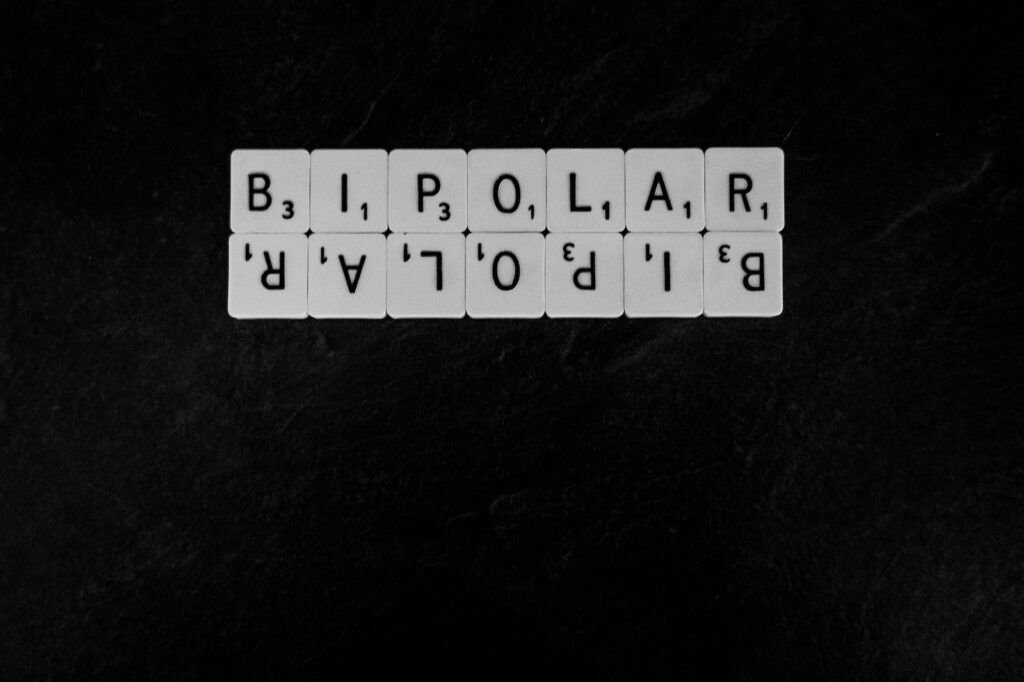As an independent clinical social worker and certified drug and alcohol counselor, my aim is to provide insight into bipolar disorder, commonly known as manic depression. This mental health condition affects millions globally, and by delving into its nuances, i can foster empathy and deliver effective treatment.
Bipolar disorder is intricate, marked by extreme mood swings oscillating between periods of heightened mania and depressive lows. Among its various forms, bipolar I and bipolar II stand out, each presenting distinct symptoms and diagnostic criteria.
In this article, I embark on a thorough exploration of bipolar disorder, unraveling the facts, potential causes, and available treatment options. Additionally, we address the challenges faced by those living with this condition and offer practical guidance for navigating the peaks and valleys of bipolar disorder.
Key Takeaways:
- Bipolar disorder involves impactful mood swings, from manic highs to depressive lows.
- Variants like bipolar I and bipolar II present unique symptoms.
- This article delves into potential causes and treatment options for bipolar disorder.
- Managing symptoms of bipolar disorder is challenging, but practical advice is available.
- Professional help is crucial if you suspect bipolar disorder in yourself or someone you know.

Unveiling the Symptoms of Bipolar Disorder
Intense mood swings may be indicative of bipolar disorder. Characterized by episodes of mania and depression, this condition significantly influences an individual's life. Recognizing the signs and symptoms is crucial for timely intervention and effective treatment.
The Signs and Symptoms of Bipolar Disorder
Symptoms can vary widely and differ for each episode. Look out for the following signs:
- Mania:
- Feeling extremely happy, elated, or irritable for an extended period.
- Increased energy, activity, or agitation.
- Engaging in risky or impulsive behaviors like gambling or substance abuse.
- Feeling extremely happy, elated, or irritable for an extended period.
- Depression:
- Feeling sad, hopeless, or worthless for an extended period.
- Loss of interest in once-enjoyed activities.
- Trouble sleeping or sleeping too much.
- Feeling sad, hopeless, or worthless for an extended period.
- General Symptoms:
- Difficulty concentrating or making decisions.
- Fatigue or loss of energy.
- Changes in appetite or weight.
- Difficulty concentrating or making decisions.
If you observe these symptoms, seeking help from a mental health professional is crucial. Bipolar disorder is treatable, and with the right support, individuals can manage symptoms and lead fulfilling lives.
"Recognizing the signs and symptoms of bipolar disorder is the first step towards getting the right treatment."
It's paramount to acknowledge that these symptoms can severely impact daily activities. Taking changes in mood or behavior seriously is crucial, as early diagnosis and treatment significantly influence an individual's quality of life.

Types of Bipolar Disorder: Exploring the Spectrum
Bipolar disorder defies a one-size-fits-all classification, showcasing a spectrum of variations, each with unique characteristics and diagnostic criteria. While some grapple with intense mood swings and episodes of mania and depression, others navigate symptoms of lesser intensity that still significantly impact their daily lives.
The primary types of bipolar disorder, bipolar I and bipolar II, present distinct features. Bipolar I disorder manifests with week-long episodes of mania, marked by elevated mood, increased energy, and decreased need for sleep. Conversely, bipolar II disorder features milder manic episodes, known as hypomania, often accompanied by more prolonged periods of depression.
Additional bipolar variations include cyclothymic disorder, characterized by numerous periods of hypomanic and depressive symptoms lasting at least two years. There are also "other specified and unspecified bipolar and related disorders," encompassing conditions like substance/medication-induced bipolar disorder and bipolar disorder due to another medical condition.
Crucially, the symptoms and severity of bipolar disorder exhibit substantial variability from person to person. Seeking professional help is imperative for an accurate diagnosis and the formulation of an effective treatment plan.

The Causes of Bipolar Disorder: From Genetics to Environmental Factors
Bipolar disorder, a complex mental health condition, lacks a singular cause. Instead, multiple factors contribute to its development, as suggested by research.
Genetics: plays a pivotal role, with studies indicating that individuals with a family history of bipolar disorder are more susceptible to developing the condition. While specific genes may predispose someone to bipolar disorder, no solitary gene has been identified as its sole cause.
Brain structure and function: are also implicated, as research reveals differences in the brains of individuals with bipolar disorder. Irregularities in the areas regulating emotions and behavior contribute to mood instability.
Environmental factors: add another layer of complexity, with trauma, high stress levels, and substance abuse potentially triggering or exacerbating bipolar symptoms.
Certain medical conditions, such as thyroid disorders, multiple sclerosis, and Parkinson's disease, have been linked to an increased risk of bipolar disorder. However, it's crucial to note that not everyone with these risk factors will develop the condition, and individuals without apparent risk factors may still experience bipolar disorder. The interplay between multiple factors likely contributes to the development of this complex condition.
Understanding bipolar disorder necessitates a holistic perspective, acknowledging the intricate web of factors that can influence its onset and progression. If you or someone you know resonates with these descriptions, seeking professional assistance is a crucial step toward understanding and managing bipolar disorder.
Living with Bipolar Disorder: Managing the Ups and Downs
Living with bipolar disorder presents its challenges, but with understanding, professional support, and a solid self-care routine, it's possible to navigate the ups and downs of this condition.
Understanding the Condition
For those with bipolar disorder, frequent mood swings are a part of daily life. During manic episodes, there's a surge of euphoria, boundless energy, and unwarranted optimism. Conversely, depressive episodes bring on feelings of hopelessness, sadness, and a profound lack of energy. Recognizing and comprehending these intense shifts in mood is pivotal for effectively managing the condition.
Professional Help is Key
Seeking professional help is a cornerstone in managing bipolar disorder. Therapeutic interventions, such as counseling, offer coping strategies, while medication plays a crucial role in stabilizing mood swings. The journey to finding the right treatment plan, tailored to each individual's unique situation, is a collaborative process.
Support from Loved Ones
A robust support system is invaluable. Loved ones can provide a sense of security, aiding in coping with the challenges of bipolar disorder. Building and maintaining connections can contribute significantly to one's well-being and overall resilience.
Prioritizing Self-Care
Self-care takes center stage when living with bipolar disorder. Engaging in activities that promote mental and physical well-being is essential for stress reduction and mood improvement. This includes regular exercise, maintaining healthy eating habits, and ensuring an adequate amount of sleep.
Living with bipolar disorder is a journey, and with the right treatment and support, it is indeed possible to manage the condition and lead a fulfilling life.

Effective Treatments for Bipolar Disorder
In the realm of bipolar disorder treatment, there's no one-size-fits-all approach. The effectiveness of a treatment plan depends on an individual's unique symptoms, medical history, and personal preferences. Here are several treatments that have demonstrated efficacy in managing bipolar disorder:
Therapy and Counseling
Therapeutic approaches, such as cognitive-behavioral therapy (CBT) and psychotherapy, have proven beneficial. These interventions help individuals identify negative thought patterns, acquire coping skills, and develop healthy behaviors, ultimately reducing symptoms and preventing relapse.
Medication
Medication, often a critical component, includes mood stabilizers like lithium, proven effective in lessening the intensity and frequency of manic and depressive episodes. Antipsychotic medications can manage symptoms of mania or psychosis, and, in some cases, carefully monitored use of antidepressants may be considered.
Lifestyle Changes
While not standalone solutions, lifestyle changes complement other treatments. Regular exercise, a balanced diet, and good sleep hygiene contribute to mood stabilization and symptom reduction. Steering clear of drugs and alcohol is crucial, as substance use can trigger and worsen episodes.
Alternative Therapies
Exploratory alternative therapies, such as acupuncture, mindfulness meditation, and yoga, are considered. While research supporting their effectiveness is limited, some individuals find them helpful in managing symptoms and enhancing overall well-being.
If you or someone you know is grappling with bipolar disorder, seeking professional help is paramount. With the right treatment plan, individuals with bipolar disorder can lead fulfilling and meaningful lives. Remember, there is hope, and support is available for those on this journey.
Medications for Bipolar Disorder: Understanding the Options
In the comprehensive treatment of bipolar disorder, medications often play a pivotal role, forming an integral part of the treatment plan. Nevertheless, the journey to finding the right medication or combination requires time, patience, and the guidance of a qualified healthcare professional. Here, I'll delve into an overview of the various types of medications commonly prescribed for bipolar disorder.
Mood Stabilizers
Mood stabilizers stand as the cornerstone of bipolar disorder medication. These drugs work by regulating mood swings, curbing the onset of manic or depressive episodes. Lithium, a venerable mood stabilizer with a track record spanning decades, is prominent in this category. Others include valproic acid, carbamazepine, and lamotrigine. While potential side effects such as weight gain, tremors, and gastrointestinal issues exist, these medications are generally well-tolerated by most individuals.
Antipsychotics
Antipsychotic medications often complement mood stabilizers, addressing symptoms of mania or psychosis. They can also be employed independently to manage depression in bipolar disorder. Common antipsychotics in this context include risperidone, olanzapine, quetiapine, and aripiprazole. Like mood stabilizers, antipsychotics may bring about side effects such as weight gain, sedation, and an elevated risk of diabetes or high cholesterol.
Antidepressants
Antidepressants may be prescribed for individuals experiencing depressive periods in bipolar disorder. However, their use is a topic of debate due to the potential to trigger episodes of mania or hypomania. When prescribed, they are typically used in conjunction with a mood stabilizer or antipsychotic medication. Commonly prescribed antidepressants for bipolar disorder include fluoxetine, bupropion, and sertraline.
Other Medications
Other medications may be incorporated into the treatment plan, including anti-anxiety medications like benzodiazepines and sleep aids such as zolpidem tartrate. Typically used on a short-term basis to address specific symptoms, these medications serve as supplementary tools in managing bipolar disorder.
It's crucial to underscore that medication should always be prescribed and monitored by a qualified healthcare professional. Finding the right medication or combination may involve some trial and error, tailored to an individual's specific symptoms and needs. Additionally, maintaining ongoing therapy and engaging in self-care practices, such as exercise and stress management, remains integral to a comprehensive treatment plan. This collaborative approach ensures that individuals can navigate the complexities of bipolar disorder with personalized and effective support.

Conclusion
In conclusion, comprehending bipolar disorder is not just a matter of awareness; it's an essential step towards fostering empathy and extending meaningful support to those navigating this condition. By understanding the signs and symptoms of bipolar disorder, I contribute to a community where individuals receive the necessary treatment to manage mood swings and embrace fulfilling lives.
There is no shame in seeking help for bipolar disorder, and it's crucial to dispel any stigma associated with mental health struggles. With the right support system, a tailored combination of medication and therapy, individuals with bipolar disorder can learn effective strategies to manage their symptoms and achieve their goals.
It's imperative to recognize that bipolar disorder is a complex condition, and there is no one-size-fits-all solution. Each person requires a unique approach to manage their condition. Yet, with dedication and perseverance, living a full and meaningful life with bipolar disorder is not just a possibility but a reality.
At Blackbird Behavioral, I understand the nuances of bipolar disorder, and I'm here to offer support tailored to your unique journey. To take the first step toward a healthier, more balanced life, I invite you to avail my 15-minute free consultation. My commitment is to provide guidance, understanding, and a pathway towards achieving your mental health goals.
Frequently Asked Questions (FAQs)
Q: What causes bipolar?
A: The exact cause of bipolar disorder is not fully understood, but it is believed to result from a combination of genetic, biological, and environmental factors. Family history, brain structure, and life events may all contribute to the development of bipolar disorder.
Q: What are 5 signs of bipolar?
A: The signs of bipolar disorder can vary, but common indicators include extreme mood swings, changes in energy levels, altered sleep patterns, difficulty concentrating, and engaging in risky behaviors during manic episodes.
Q: What are the 3 main symptoms of bipolar?
A: The three main symptoms of bipolar disorder include manic episodes (elevated mood, increased energy), depressive episodes (sadness, hopelessness), and hypomanic episodes (milder form of mania). Individuals may experience a combination of these symptoms.
Q: What is a person with bipolar like?
A: Individuals with bipolar disorder can have diverse personalities, but their experiences often involve navigating intense mood swings, from euphoric highs to debilitating lows. Effective management typically involves a combination of medication, therapy, and support.
Q: Can bipolar be cured?
A: Bipolar disorder is a chronic condition, and there is no known cure. However, with the right treatment plan, including medication, therapy, and lifestyle adjustments, individuals can effectively manage symptoms and lead fulfilling lives.
Q: Can bipolar disorder go away?
A: Bipolar disorder is a lifelong condition, but with appropriate treatment and ongoing support, individuals can learn to manage and control their symptoms, leading to periods of stability and well-being.
Q: How do you confirm bipolar?
A: Diagnosing bipolar disorder involves a comprehensive evaluation by a mental health professional. This may include a thorough assessment of symptoms, medical history, and sometimes laboratory tests. A precise diagnosis allows for the formulation of an effective treatment plan.
Q: What age does bipolar start in females?
A: Bipolar disorder can emerge at any age, but it often starts in late adolescence or early adulthood. However, it can also begin in childhood or later in life.
Q: Can bipolar people be happy?
A: Yes, individuals with bipolar disorder can experience happiness. Effective treatment and support help in managing the condition, allowing for periods of stability and well-being.
Q: Do bipolar regret breakups?
A: Like anyone else, individuals with bipolar disorder may experience regret after a breakup. The emotional impact can be profound, but reactions vary widely among individuals. Seeking support from friends, family, or a therapist can be beneficial during such challenging times.






